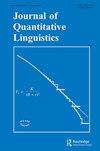词汇特征与心理状态:定量语言学研究
IF 1.7
2区 文学
0 LANGUAGE & LINGUISTICS
引用次数: 0
摘要
摘要近几十年来,人们对词汇特征与心理状态文本之间的关系越来越感兴趣。以往的研究表明,心理状态语篇的某些词汇特征存在显著差异。然而,语篇层面的词汇特征却很少受到关注。本文通过考察定量语言指标在心理问题文本分类中的表现来扩展这项工作。一个包含焦虑、抑郁、自杀意念和正常状态文本的大型论坛帖子数据集,用机器学习算法进行了实验。结果表明,使用机器学习算法的定量语言指标在识别心理状态方面取得了很高的成功。同时,一些定量的语言指标,如ALT和作者观点,可以提取出足够的词汇特征,对不同心理状态的文本进行分类。本研究可能是第一次尝试使用定量语言指标作为词汇特征来检测心理状态文本,研究结果可能有助于我们理解如何提高识别各种心理状态的准确性。最后,讨论了这些发现的意义。本文中表达的所有声明仅代表作者的观点,并不一定代表其附属组织的观点,也不代表出版商、编辑和审稿人的观点。任何产品,可能在本文中进行评估,或声称,可能是由其制造商,是不保证或认可的出版商。感谢JQL审稿人和编辑们的宝贵意见。他们的建议大大提高了初稿的质量。作者声明,本研究是在没有任何可能被解释为潜在利益冲突的商业或财务关系的情况下进行的。数据可用性声明本研究分析了公开可用的数据集。这些数据可以在这里找到:我们使用了AlMosaiwi和Johnstone(2018)的数据集,可以在https://doi.org/10.6084/m9.figshare.474 3547.v1访问。补充数据本文的补充数据可以在线访问https://doi.org/10.1080/09296174.2023.2256211.Notes1。本研究由中央高校基本科研业务费专项资金(批准号:3132023331)资助。本文章由计算机程序翻译,如有差异,请以英文原文为准。
Lexical Features and Psychological States: A Quantitative Linguistic Approach
ABSTRACTIn recent decades, there has been an increasing interest in the relation between lexical features and texts of psychological states. Previous studies demonstrated that some lexical features varied significantly among the texts of psychological states. However, the lexical features at the textual level have received little attention. This paper extends this work by examining the performance of quantitative linguistic indices in classifying texts of psychological issues. A large dataset of forum posts including texts of anxiety, depression, suicide ideation, and normal states were experimented with Machine Learning algorithms. The results revealed that the quantitative linguistic indices with Machine Learning algorithms achieved a high level of success in identifying psychological states. Meanwhile, some quantitative linguistic indices, namely, ALT and Writer’s view, may extract adequate lexical features for classifying texts of different psychological states. The study is probably the first attempt that uses quantitative linguistic indices as lexical features to detect texts of psychological states, and the findings may contribute to our understanding of how accuracy may be enhanced in the identification of various psychological states. Finally, the implications of these findings are discussed. Publisher’s NoteAll claims expressed in this article are solely those of the authors and do not necessarily represent those of their affiliated organizations, or those of the publisher, the editors and the reviewers. Any product that may be evaluated in this article, or claim that may be made by its manufacturer, is not guaranteed or endorsed by the publisher.AcknowledgmentsWe thank the JQL referees and the editors for their insightful comments. Their suggestions have significantly enhanced the quality of the initial manuscripts.Disclosure StatementThe authors declare that the research was conducted in the absence of any commercial or financial relationships that could be construed as a potential conflict of interest.Data Availability StatementPublicly available datasets were analysed in this study. This data can be found here: We used AlMosaiwi and Johnstone’s (2018) dataset which can be accessed at https://doi.org/10.6084/m9.figshare.474 3547.v1.Supplemental dataSupplemental data for this article can be accessed online at https://doi.org/10.1080/09296174.2023.2256211.Notes1. The dataset can be accessed at https://doi.org/10.6084/m9.figshare.4743547.Additional informationFundingThis study was Supported by “the Fundamental Research Funds for the Central Universities” (Grant No. 3132023331).
求助全文
通过发布文献求助,成功后即可免费获取论文全文。
去求助
来源期刊

Journal of Quantitative Linguistics
Multiple-
CiteScore
2.90
自引率
7.10%
发文量
7
期刊介绍:
The Journal of Quantitative Linguistics is an international forum for the publication and discussion of research on the quantitative characteristics of language and text in an exact mathematical form. This approach, which is of growing interest, opens up important and exciting theoretical perspectives, as well as solutions for a wide range of practical problems such as machine learning or statistical parsing, by introducing into linguistics the methods and models of advanced scientific disciplines such as the natural sciences, economics, and psychology.
 求助内容:
求助内容: 应助结果提醒方式:
应助结果提醒方式:


